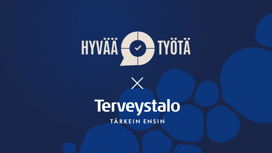Competitive advantage from nicotine-free life
The use of nicotine products in Finland is changing. Only about one in ten people of working age smoke daily and the trend has been downwards for several decades. Although the trend towards smoke-free status is progressing, nicotine dependence is by no means declining at the same pace, as the vacuum left by traditional smoking has been rapidly filled by smokeless nicotine products.
According to Melina Virtanen and Noora Smal, occupational health nurses and nicotine-free treatment specialists at Terveystalo, nicotine addiction is not just an individual issue, but has a direct impact on the performance of the whole workplace and the costs to the employer.
- Studies show that the use of nicotine products is reflected in increased sickness absence, reduced alertness and even difficulty concentrating on work. Breaks during the working day associated with the use of nicotine products interrupt the rhythm of work and can undermine community spirit. In addition, nicotine dependence can increase stress and strain as the need to use regulates everyday life. Investing in nicotine-free living can therefore be one of the most effective ways to improve the well-being of the whole work community and the productivity of the company," says Virtanen.
The use of smoke-free nicotine products is becoming more common in Finland
Smoking regulation has tightened since the 1990s, moving smoking from workplaces and indoor areas to restricted outdoor areas. The aim of the Finnish tobacco law is to eliminate the use of toxic and addictive tobacco products and other nicotine-containing products by 2030.
While smoking is no longer very visible in the workplace, nicotine sachets and e-cigarettes are becoming increasingly familiar sights in workplaces, with daily use of nicotine sachets, for example, more than tripling in the early 2020s, and e-cigarette use exploding, especially among younger age groups. Products are often used in parallel, increasing the risk of addiction. Tobacco and nicotine dependence is a disease with strong psychological and social components.
- Nicotine directly affects the brain's reward system and mood. Psychologically, it is linked to emotions and routines, and many people perceive nicotine products as calming in a stressful situation or improving concentration, for example, when in reality it is a temporary relief from withdrawal symptoms. Socially, nicotine use is reinforced by the environment and this is particularly evident in the increased consumption of e-cigarettes by people under 30, as vaping has become a way of being part of a group," says Smal.
Being nicotine-free is more than a health act
Six out of ten Finnish nicotine users would like to quit and around four out of ten try to quit every year. As many as eight out of ten are concerned about the impact of smoking on their health. A combination of medication and counselling is perceived to be the most effective treatment.
- Quitting nicotine products is most successful when all three dimensions are taken into account: medical support can facilitate cessation, but psychological support and a change in the social environment, where the employer plays a crucial role, are equally important. For the sake of health, well-being and well-being at work, it is important that workplaces promote smoke-free behaviour and support smoking cessation," says Smal.
- Promoting nicotine-free work does not require a huge investment from employers. Nicotine-free policies can start with small steps, such as a clear nicotine-free workplace policy and support for staff to help them make the change. Supporting nicotine-free workplaces is an investment in staff health, financial sustainability and corporate responsibility. It is a choice that benefits both the individual and the organisation as a whole," adds Virtanen.
Want to learn more about how you can support your staff to break nicotine addiction?
Contact your occupational health nurse or account manager to find out more about individual and group support.





